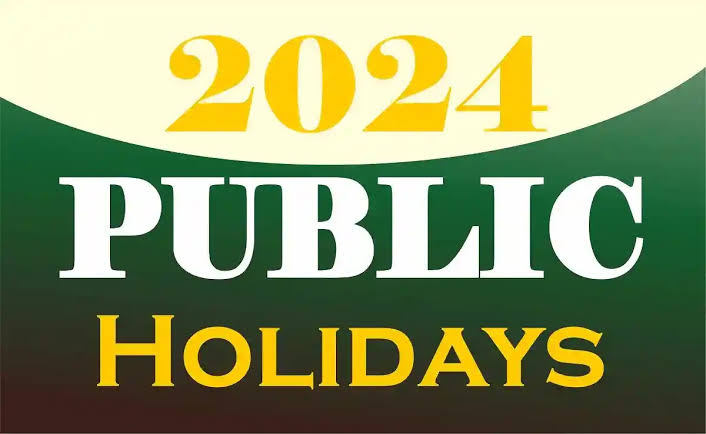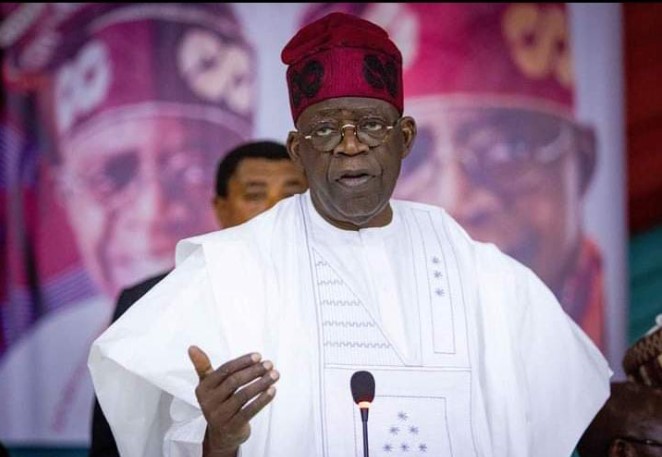Lifestyle
Here Are List Of Public Holidays In Nigeria In 2024

In 2024, Nigeria observes a diverse array of public holidays, each holding cultural, historical, or religious significance.
These holidays not only provide a break from the routine of daily life but also serve as occasions for reflection, celebration, and communal gatherings.
The calendar begins with New Year’s Day, marking the start of the year with festivity and optimism. However, in this report, we have exclusively gathered list of public holidays in Nigeria in 2024.
1. New Year’s Day – January 1, 2024
In Nigeria, January 1, 2024, marks the celebration of New Year’s Day, a public holiday observed nationwide. This day holds cultural and social significance as it symbolizes the beginning of a fresh year, offering a collective moment for reflection, renewal, and hope for the future. It is a time when people come together to bid farewell to the previous year and welcome the opportunities and challenges that lie ahead.
The designation of January 1 as a public holiday allows Nigerians to engage in various festivities and traditions. Communities across the country organize events, gatherings, and religious services to commemorate the occasion. Many individuals take this opportunity to spend time with family and friends, fostering a sense of unity and shared joy.
Additionally, the public holiday provides citizens with a well-deserved break from work and routine, encouraging leisure and relaxation as they usher in the new year with positivity and optimism.
Moreover, New Year’s Day in Nigeria is often marked by fireworks, music, dance, and other cultural expressions that reflect the rich diversity of the nation. It is a time when people set personal and communal goals, emphasizing the importance of growth and progress. Overall, the celebration of New Year’s Day as a public holiday in Nigeria serves as a momentous occasion for individuals and communities to come together, strengthen bonds, and embrace the promise of a new beginning.
2. Good Friday – March 29, 2024
In Nigeria, March 29, 2024, holds special significance as it marks Good Friday, a widely observed public holiday.
Good Friday commemorates the crucifixion of Jesus Christ and is a solemn day in the Christian calendar. On this occasion, many Nigerians participate in religious services, processions, and reflections that focus on the sacrifice and teachings of Jesus. The public holiday allows for a meaningful pause in daily life, providing individuals across the country with the opportunity for spiritual contemplation and observance.
The designation of Good Friday as a public holiday in Nigeria underscores the nation’s commitment to religious diversity and respect for various faiths. While it holds profound importance for Christians, the day is recognized and respected by people of different religious backgrounds, fostering a sense of unity and understanding. This inclusive approach reflects Nigeria’s cultural mosaic and promotes an environment where citizens can appreciate and celebrate religious traditions that contribute to the country’s rich tapestry.
As a public holiday, Good Friday also serves as a time for families to come together and engage in traditions that reinforce their religious and cultural values. Many communities organize events, charitable activities, and communal meals, creating a sense of shared purpose and solidarity. Overall, the observance of Good Friday as a public holiday in Nigeria not only honors the religious beliefs of a significant portion of the population but also encourages a spirit of tolerance and harmony within the diverse fabric of the nation.
3. Easter Monday – April 1, 2024
April 1, 2024, holds special significance in Nigeria as it marks Easter Monday, a widely celebrated public holiday. Falling the day after Easter Sunday, this day is an extension of the Easter festivities, providing Nigerians with an opportunity to continue their reflections on the resurrection of Jesus Christ and the themes of renewal and hope. Easter Monday is recognized as a day of joy and merriment, with various cultural and religious activities taking place across the country.
As a public holiday, Easter Monday allows families and communities to come together for continued celebrations. Many Nigerians take advantage of the day off to organize picnics, outings, and festive gatherings. It is a time when people engage in activities that strengthen social bonds and create lasting memories. Additionally, religious services and events continue, emphasizing the central message of Easter and promoting spiritual growth and unity.
The designation of Easter Monday as a public holiday in Nigeria reflects the country’s commitment to honoring its diverse religious landscape. While Easter Monday holds particular significance for Christians, the public holiday serves as a unifying factor, bringing together individuals from different faiths to appreciate the cultural richness of the nation. Overall, Easter Monday serves as a time for reflection, celebration, and communal harmony, contributing to the vibrant tapestry of traditions that make up Nigeria’s cultural mosaic.
4. Eid-ul-Fitr – Date May Vary (Between April 9, to April 11, 2024 )
The date for the public holiday for Eid-ul-Fitr vary in 2024. The Islamic holiday like this may vary based on the sightings of the moon. However, Eid-ul-Fitr holds immense cultural and religious importance in Nigeria as it marks the end of Ramadan, the Islamic holy month of fasting. Recognizing the significance of this joyous occasion, Nigeria designates Eid-ul-Fitr as a public holiday, allowing Muslims across the country to come together in festive observance.
This day symbolizes the breaking of the fast and is a time for gratitude, generosity, and community.
The public holiday status of Eid-ul-Fitr in Nigeria underscores the nation’s commitment to respecting and accommodating its diverse religious communities. It is a reflection of the country’s cultural inclusivity, recognizing the Islamic traditions that contribute to the nation’s cultural mosaic. Nigerians, both Muslims and non-Muslims, often participate in the celebrations by exchanging greetings, sharing meals, and engaging in acts of charity. The public holiday fosters an atmosphere of unity and understanding, promoting social cohesion among citizens of different religious backgrounds.
Eid-ul-Fitr in Nigeria is marked by special prayers, festive meals, and the exchange of gifts and goodwill. Families and communities come together to celebrate the end of Ramadan, reinforcing the values of compassion and togetherness. The public holiday not only allows Muslims to observe their religious traditions but also provides an opportunity for all Nigerians to join in the spirit of festivity, strengthening the bonds of friendship and solidarity across the nation.
5. Workers Day – May 1, 2024
May 1, 2024, stands out in Nigeria as the nation observes Workers’ Day, a significant public holiday dedicated to honoring the contributions of the labor force. Recognized globally, Workers’ Day, also known as Labour Day, is a time to celebrate the achievements and rights of workers, acknowledging their dedication and hard work. In Nigeria, this public holiday serves as a platform for expressing gratitude to the workforce and highlighting the importance of fair labor practices.
The designation of May 1 as a public holiday in Nigeria emphasizes the nation’s commitment to workers’ rights and their role in the country’s progress. It provides an opportunity for various labor unions and organizations to organize events, parades, and gatherings, where workers can come together to voice their concerns and advocate for better working conditions. This public holiday symbolizes unity and solidarity among the labor force, creating a sense of empowerment and camaraderie.
Workers’ Day also serves as a time for reflection on the achievements and challenges faced by the labor community. It prompts discussions on labor policies, workers’ rights, and social issues related to employment. Additionally, the public holiday allows workers to enjoy a well-deserved break, spending quality time with family and friends. Overall, Workers’ Day in Nigeria plays a crucial role in recognizing and appreciating the invaluable contributions of the labor force to the nation’s development.
6. Children’s Day – May 27, 2024
May 27, 2024, holds special significance in Nigeria as the nation celebrates Children’s Day, a dedicated public holiday that highlights the importance of nurturing and safeguarding the well-being of its youngest citizens. This day is an opportunity to recognize the unique needs, aspirations, and potential of children, emphasizing their role as the future leaders of the country.
The public holiday is marked by various activities and events designed to create a joyous and supportive environment for children across the nation.
The designation of May 27 as Children’s Day in Nigeria reflects the country’s commitment to promoting the rights and welfare of its youth. On this public holiday, schools, communities, and organizations organize special programs, including educational events, cultural performances, and sports activities, to celebrate the diversity and talents of Nigerian children. The day also serves as a reminder to address the challenges faced by children, advocating for their rights to education, health, and a nurturing environment.
Children’s Day in Nigeria fosters a sense of unity and inclusivity, encouraging people from all walks of life to come together in support of the nation’s youth. It provides an opportunity for policymakers and communities to reflect on the progress made in ensuring the well-being of children and to identify areas that require further attention. Overall, Children’s Day serves as a vibrant and positive occasion, celebrating the potential and innocence of Nigeria’s children while reinforcing the collective responsibility to provide them with a nurturing and supportive environment for their growth and development.
7. Democracy Day – June 12, 2024
June 12, 2024, is a significant day in Nigeria as it marks Democracy Day, a public holiday commemorating the restoration of democratic governance in the country. This day is closely associated with the historic events of June 12, 1993, when Nigerians participated in a presidential election widely regarded as free and fair. The subsequent annulment of that election led to pro-democracy movements, eventually paving the way for the return of civilian rule in 1999. The public holiday serves as a reminder of the struggles and sacrifices made to uphold democratic principles in Nigeria.
The designation of June 12 as Democracy Day reflects Nigeria’s commitment to celebrating and preserving its democratic values. On this public holiday, citizens engage in various activities, including parades, discussions, and seminars, to promote civic awareness and participation. Democracy Day serves as an occasion to reflect on the importance of democratic governance, civic responsibilities, and the need for citizens to actively contribute to the democratic process.
Beyond the historical context, Democracy Day in Nigeria also provides an opportunity for leaders and citizens to evaluate the state of the nation’s democracy and discuss ways to strengthen democratic institutions. It fosters a sense of national unity and reinforces the principles of accountability, transparency, and inclusivity. Overall, the observance of Democracy Day underscores the resilience of Nigerians in upholding democratic ideals and encourages ongoing efforts to ensure a vibrant and participatory democratic system in the country.
8. Eid-ul-Adha – Date May Vary (Likely June 17, 2024)
The date for the public holiday for Eid-ul-Adha vary in 2024. The Islamic holiday like this may vary based on the sightings of the moon. However, Eid-ul-Adha is a significant public holiday in Nigeria, marking the culmination of the Hajj pilgrimage and commemorating the willingness of Prophet Ibrahim (Abraham) to sacrifice his son as an act of obedience to God. Commonly known as the Feast of Sacrifice, this Islamic festival is celebrated with prayer, feasting, and the ritual sacrifice of animals. The public holiday status of Eid-ul-Adha in Nigeria reflects the country’s respect for its diverse religious communities and their cultural traditions.
As a public holiday, Eid-ul-Adha allows Muslims in Nigeria to gather for special prayers and participate in community events that emphasize the values of sacrifice, generosity, and compassion. Families come together to share festive meals, exchange gifts, and engage in acts of charity, reinforcing the sense of community and unity. The holiday also emphasizes the importance of sharing blessings with those less fortunate, as Muslims are encouraged to distribute a portion of the sacrificial meat to those in need.
Nigeria’s recognition of Eid-ul-Adha as a public holiday underscores the nation’s commitment to fostering religious tolerance and understanding. It provides an opportunity for people of different faiths to learn about and appreciate the cultural diversity within the country. Overall, the observance of Eid-ul-Adha contributes to the rich tapestry of religious celebrations in Nigeria, promoting unity and reinforcing the values of compassion and goodwill.
9. Mawlud Nabiyy (Date May Vary) – Likely September 15 or September 16, 2024)
The date for the public holiday for Mawlud Nabiyy vary in 2024. The Islamic holiday like this may vary based on the sightings of the moon. However, Mawlud Nabiyy, is a significant public holiday in Nigeria, marking the birth of the Prophet Muhammad. Also known as Eid Milad-un Nabi, this Islamic celebration holds great religious and cultural importance. The public holiday allows Muslims in Nigeria to come together in commemoration of Prophet Muhammad’s life, teachings, and his role as the final prophet in Islam. The day is marked by special prayers, processions, and community events.
The designation of Mawlud Nabiyy as a public holiday in Nigeria underscores the nation’s commitment to recognizing and respecting the religious diversity of its population. It provides an opportunity for Muslims across the country to engage in acts of charity, promoting the values of compassion and kindness emphasized by the Prophet. The public holiday also serves as a time for reflection on the Prophet’s teachings and their relevance to contemporary society.
Mawlud Nabiyy is a festive occasion where families and communities come together to share meals, exchange greetings, and strengthen social bonds.
The public holiday encourages a spirit of unity and understanding among people of different faiths, fostering an environment where religious traditions are acknowledged and celebrated. Overall, the observance of Mawlud Nabiyy in Nigeria contributes to the nation’s cultural richness and promotes a sense of harmony and respect among its diverse religious communities.
10. Independence Day – October 1, 2024
October 1, 2024, marks a momentous occasion in Nigeria as the nation celebrates Independence Day, a public holiday that commemorates the country’s freedom from colonial rule. On this historic day in 1960, Nigeria gained independence from British colonial administration, marking the beginning of a new chapter in its history. The public holiday is a symbol of national pride and unity, and it serves as an opportunity for Nigerians to reflect on the struggles and sacrifices made by their forebears in the pursuit of sovereignty.
The designation of October 1 as Independence Day in Nigeria reflects the nation’s commitment to honoring its rich history and diverse cultural heritage. The public holiday is marked by various activities, including parades, cultural displays, and ceremonies, showcasing the country’s resilience and progress since attaining independence. It is a time for citizens to come together, reaffirm their commitment to national development, and celebrate the achievements that have shaped the identity of the nation.
Independence Day in Nigeria also provides a platform for leaders to address the nation, outlining future plans, and emphasizing the importance of unity and patriotism. The public holiday fosters a sense of collective responsibility and civic pride, encouraging citizens to actively contribute to the nation’s growth and prosperity. Overall, Independence Day serves as a poignant reminder of Nigeria’s journey to self-governance and highlights the resilience and aspirations of its people towards building a vibrant and prosperous nation.
11. Christmas Day – December 25, 2024
December 25, 2024, is a day of joy and celebration in Nigeria as the country observes Christmas Day, a widely recognized public holiday that commemorates the birth of Jesus Christ. This festive occasion holds immense cultural and religious significance for the Christian community in Nigeria and is marked by various traditions and expressions of goodwill.
As a public holiday, Christmas Day provides an opportunity for Nigerians of all backgrounds to come together in the spirit of love, generosity, and togetherness.
The designation of December 25 as a public holiday in Nigeria reflects the country’s commitment to religious diversity and inclusivity. While Christmas is primarily a Christian celebration, the public holiday is respected and enjoyed by people of different faiths, emphasizing the nation’s cultural tolerance. Communities across Nigeria organize vibrant celebrations, including church services, carol singing, festive meals, and the exchange of gifts. The public holiday creates an atmosphere of warmth and unity, fostering a sense of shared celebration among the population.
Christmas Day is a time when families and friends gather to celebrate, strengthening bonds and creating lasting memories. It is a season of goodwill, characterized by acts of charity and kindness. As a public holiday, Christmas Day provides a welcome break for individuals to enjoy the festivities and reflect on the values of love, compassion, and hope that the season represents. Overall, the observance of Christmas Day in Nigeria contributes to the country’s cultural mosaic, promoting unity and fostering a sense of joy and shared celebration.
12. Boxing Day – December 26, 2024
December 26, 2024, holds significance in Nigeria as the country observes Boxing Day, a public holiday that traces its origins to the tradition of giving boxes of gifts to those less fortunate. While the exact origins of the name are debated, Boxing Day in Nigeria is often marked by acts of charity, community service, and festive gatherings.
As a public holiday, it provides an opportunity for Nigerians to extend the spirit of generosity beyond the Christmas Day celebrations.
The designation of December 26 as Boxing Day reflects Nigeria’s commitment to emphasizing the values of compassion and goodwill. Many individuals and organizations take advantage of the public holiday to engage in charitable activities, such as distributing food, clothing, and gifts to the needy. Communities come together to organize events that promote a sense of unity and shared responsibility, fostering an environment of care and support for those facing challenges.
Boxing Day also serves as a time for relaxation and enjoyment, with many Nigerians using the public holiday to spend quality time with family and friends. Festive meals, entertainment, and outdoor activities contribute to the celebratory atmosphere.
The public holiday encourages people to reflect on the importance of giving back to their communities and promotes a sense of gratitude for the blessings they have received. Overall, Boxing Day in Nigeria is a day of both reflection and celebration, emphasizing the spirit of generosity and community that is central to the holiday season.
-

 Breaking News2 years ago
Breaking News2 years agoBREAKING: CBN Redesigns Naira Notes
-

 Breaking News12 months ago
Breaking News12 months agoBREAKING: Tinubu Considers Temporary Subsidy On Petrol
-

 News2 years ago
News2 years agoDrama As Church Gives Certificate Of Virginity To Ladies After Testing Them (See Photos)
-

 Crime2 years ago
Crime2 years agoUproar As Student Teacher On Teaching Practice Impregnates 24 Girls, Headmistress, Four Female Teachers
-

 Breaking News4 months ago
Breaking News4 months agoJUST IN: Gbajabiamila Dies In UK
-

 Breaking News10 months ago
Breaking News10 months agoBREAKING: Dangote Speaks As BUA Reduces Price Of Cement
-

 Breaking News11 months ago
Breaking News11 months agoFLASH: Govt Declares Monday As Public Holiday
-

 Crime2 years ago
Crime2 years agoJUST IN: Gunmen Storm Osogbo, Kill Man, Daughter Few Hours After His Wife Put To Bed (Photos)











